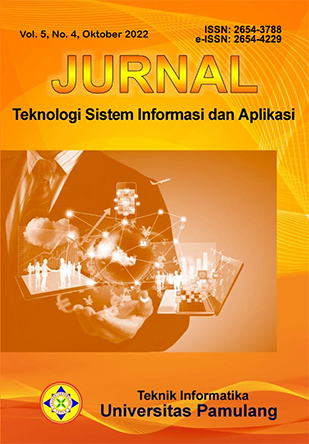Pengembangan Aplikasi Absen Online Menggunakan Model Prototype di Sekolah Dasar Negeri Nagrak Tigaraksa
DOI:
https://doi.org/10.32493/jtsi.v5i4.21167Keywords:
systems, absences, networking, design, prototype, ios, androidAbstract
The current attendance system requires a new system update. Because doing this would be very good for the institution of education, viewed from the sides as efficient, effective, quick, mastered and transparent. This would require a design before the system was built that would reveal the problems and solutions to the existing system. The online attendance system design is used to accelerate absenteeation by feedback that will then connect to android smartphone or ios through the whatsapp application owned by the student's parents. This requires an Internet link connected by smartphone on each parent. To create a report by the methods of the above system requires a workable data-collection system, with prototype methods and testing as establishment of an adequate proposal system as alternative to the best solution of the problem in the institution of education.References
A. Husain, A. H. (2017). “Perancangan Sistem Absensi Online Menggunakan Android Guna Mempercepat Proses Kehadiran Karyawan Pada PT. Sintech Berkah Abadiâ€. Technomedia J., vol. 2, no. 1, pp. 105–116.
Ahrizal, D., Miftah, M. K., Kurniawan, R., Zaelani, T., & Yulianti, Y. (2020). Pengujian Perangkat Lunak Sistem Informasi Peminjaman PlayStation dengan Teknik Boundary Value Analysis Menggunakan Metode Black Box Testing. Jurnal Informatika Universitas Pamulang, 5(1), 73-77. doi:10.32493/informatika.v5i1.4338
Ijudin, A., & Saifudin, A. (2020). Pengujian Black Box pada Aplikasi Berita Online dengan Menggunakan Metode Boundary Value Analysis. Jurnal Informatika Universitas Pamulang, 5(1), 8-12. doi:10.32493/informatika.v5i1.3717
Ilham, A. A., Azmi, A., Ramadhani, A. R., Falah, D. F., & Saifudin, A. (2021). Pengujian Sistem Informasi Parkir PT KISP Berbasis Desktop dengan Metode Black-Box. Jurnal Informatika Universitas Pamulang, 6(1), 96-101. doi:10.32493/informatika.v6i1.8547
Manu, G. &. (2020). Pengembangan Sistem Absensi Online Berbasis Web Menggunakan Maps Javascripts API. Jurnal Pendidikan Teknologi Informasi (JUKANTI).
Maulana, A., Kurniawan, A., Keumala, W., Sukma, V. R., & Saifudin, A. (2020). Pengujian Black Box pada Aplikasi Penjualan Berbasis Web Menggunakan Metode Equivalents Partitions (Studi Kasus: PT Arap Store). Jurnal Teknologi Sistem Informasi dan Aplikasi, 3(1), 50-56. doi:10.32493/jtsi.v3i1.4307
R. A. Fitri Andini, M. I. (2017). Perancangan Dan Implementasi Sistem Absensi Online Berbasis Android Di Lingkungan Universitas Negeri Jakarta. FMIPA UNJ,†Sist. Inf., vol. 1, no. 1, pp. 1–10, 2017.
Shaleh, I. A., Prayogi, J., Pirdaus, P., Syawal, R., & Saifudin, A. (2021). Pengujian Black Box pada Sistem Informasi Penjualan Buku Berbasis Web dengan Teknik Equivalent Partitions. Jurnal Teknologi Sistem Informasi dan Aplikasi, 4(1), 38-45. doi:10.32493/jtsi.v4i1.8960
Sinulingga, A. R., Zuhri, M., Mukti, R. B., Syifa, Z., & Saifudin, A. (2020). Pengujian Black Box pada Sistem Aplikasi Informasi Data Kinerja Menggunakan Teknik Equivalence Partitions. Jurnal Teknologi Sistem Informasi dan Aplikasi, 3(1), 9-14. doi:10.32493/jtsi.v3i1.4303
Susanto, J., Biqirrosyad, B., Junaidi, M. M., Sudrajat, Y., & Desyani, T. (2021). Pengujian Black Box pada Aplikasi Desktop Penjualan Elektronik Menggunakan Metode Equivalence Partitioning. Jurnal Teknologi Sistem Informasi dan Aplikasi, 4(1), 38-45. doi:10.32493/jtsi.v4i1.8960
Trengginaz, R. B., Yusup, A., Sunyoto, D. S., Jihad, M. R., & Yulianti, Y. (2020). Pengujian Aplikasi Pemesanan Tiket Kereta berbasis Website Menggunakan Metode Black Box dengan Teknik Equivalence Partitioning. Jurnal Teknologi Sistem Informasi dan Aplikasi, 3(3), 144-149. doi:10.32493/jtsi.v3i3.5349
Downloads
Published
How to Cite
Issue
Section
License
Copyright (c) 2022 Teti Desyani, Ahmad Raihan Gymnastiar, Bani Adam, Rizki Utama Sunardi, Stanislaus Dimas Dwiardi, Munawaroh Munawaroh

This work is licensed under a Creative Commons Attribution-NonCommercial 4.0 International License.
Authors who publish with this journal agree to the following terms:
- Authors retain copyright and grant the journal right of first publication with the work simultaneously licensed under a Creative Commons Attribution License that allows others to share the work with an acknowledgement of the work's authorship and initial publication in this journal.
- Authors are able to enter into separate, additional contractual arrangements for the non-exclusive distribution of the journal's published version of the work (e.g., post it to an institutional repository or publish it in a book), with an acknowledgement of its initial publication in this journal.
- Authors are permitted and encouraged to post their work online (e.g., in institutional repositories or on their website) prior to and during the submission process, as it can lead to productive exchanges, as well as earlier and greater citation of published work (See The Effect of Open Access).
Jurnal Teknologi Sistem Informasi dan Aplikasi have CC BY-NC or an equivalent license as the optimal license for the publication, distribution, use, and reuse of scholarly work.
In developing strategy and setting priorities, Jurnal Teknologi Sistem Informasi dan Aplikasi recognize that free access is better than priced access, libre access is better than free access, and libre under CC BY-NC or the equivalent is better than libre under more restrictive open licenses. We should achieve what we can when we can. We should not delay achieving free in order to achieve libre, and we should not stop with free when we can achieve libre.
This work is licensed under a Creative Commons Attribution-NonCommercial 4.0 International (CC BY-NC 4.0) License
YOU ARE FREE TO:
- Share - copy and redistribute the material in any medium or format
- Adapt - remix, transform, and build upon the material for any purpose, even commercially.
- The licensor cannot revoke these freedoms as long as you follow the license terms



_2020_-_7(2)_2024_-_Thumbnail.png)












